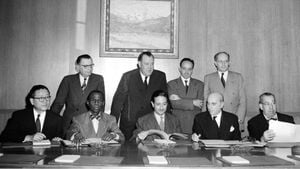Bela Karolyi, the renowned gymnastics coach known for guiding numerous athletes to Olympic glory, has passed away at the age of 82. His death marks the end of an era for gymnastics, especially following his controversial involvement amid the fallout from the sexual abuse scandal surrounding former USA Gymnastics doctor Larry Nassar.
Born on September 13, 1942, in Romania, Karolyi made his name training elite gymnasts, including Olympic champion Kerri Strug and the Magnificent Seven, the U.S. women's gymnastics team at the 1996 Atlanta Olympics. Strug captured hearts and headlines alike when she famously vaulted on an injured ankle to secure gold for her team, showcasing not just her talent but also Karolyi's coaching prowess.
Karolyi's coaching methods, characterized by their intensity and insistence on perfection, garnered both respect and criticism. While many admired his ability to develop champions, his approach was often seen as harsh. His training camps, particularly the Karolyi Ranch in Texas, became infamous for stringent routines and strict discipline, creating both champions and controversies.
His legacy, though undeniably marked by the athletic achievements he facilitated, is now tangled with the serious allegations against key figures within USA Gymnastics. The 2016 revelations about Nassar's abuse, which affected numerous gymnasts, prompted widespread scrutiny, and Karolyi faced severe backlash for his potential complicity or negligence.
Despite distancing himself from scandal-related accusations, Karolyi's connection to the broader environment of USA Gymnastics drew questions about the culture of silence and fear reigning during his tenure. This criticism intensified as gymnasts came forward with their stories, many expressing their struggles with the treatment and systems entrenched within the sport.
Karolyi had continued to be involved with gymnastics even amid growing criticisms, serving as a figure whose influence could not be overlooked. His passing serves as both recognition of his significant role within gymnastics and acknowledgment of the need for change within the sport's culture going forward.
Troubling discussions around coaching methods have emerged, highlighting the necessity of creating safe and supportive environments for athletes. Karolyi’s methods, deemed effective by some, were branded as abusive by others, leading to calls for comprehensive reform within gymnastics and similar high-stakes sports.
Compounding Karolyi's legacy are the actions of the organization he long represented. USA Gymnastics has undertaken efforts to address and rectify the failings laid bare by the Nassar case, but the healing process is undoubtedly complex and will take time.
Karolyi's lasting impact on the sport lies not only within the medals and accolades but also within the lessons learned from the dark chapters associated with competition. His commitment to gymnastics and the athletes he mentored remains undeniable, but as the world processes his death, the conversation around athlete welfare continues to evolve.
While many mourn his loss and celebrate the triumphs achieved under his guidance, it’s equally important to reflect on and confront past injustices, ensuring the sport transforms for the next generation of athletes.
Karolyi is survived by his wife, Márta, and their two children, as well as the countless gymnasts who trained under him, each carrying forward pieces of his legacy.
His passing opens up discussions on how gymnastics can move beyond the shadows of abuse and create environments where athletes can realize their dreams without fear. Simply put, the gymnastics community is at a crossroads, and grappling with past failures will be key to forging a brighter future.



